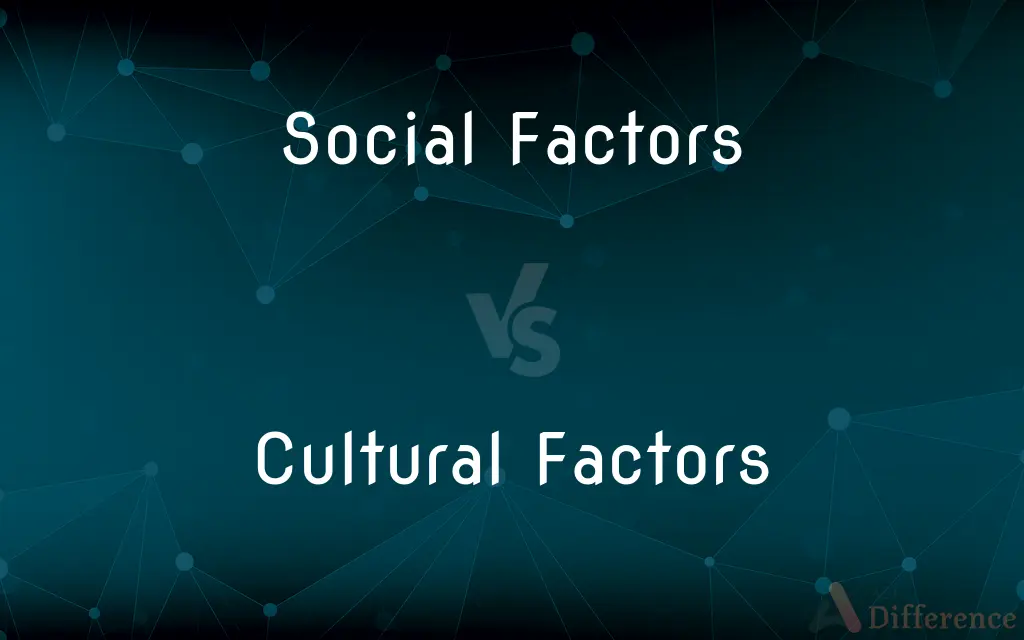Social Factors vs. Cultural Factors — What's the Difference?
By Tayyaba Rehman — Published on November 22, 2023
Social Factors are aspects influencing societal relationships and structures. Cultural Factors are elements affecting shared beliefs, values, and customs.

Difference Between Social Factors and Cultural Factors
Table of Contents
ADVERTISEMENT
Key Differences
Social Factors refer to elements that affect social relationships and structures, impacting how communities and individuals interact. Cultural Factors, on the other hand, are elements that shape and influence the shared beliefs, values, norms, and practices within a particular group or society. Both play pivotal roles in shaping societies, but they derive from different spheres of societal influence.
Social Factors often involve aspects such as class, gender, and social roles that shape societal function. These factors affect societal structures, influencing how communities form and operate. Cultural Factors, however, dive into the shared experiences, beliefs, rituals, and values of a group of people. This realm is where traditions, languages, and religious practices are fostered and preserved.
When we look at Social Factors, these elements are crucial in understanding social interaction, relationships, structures, and systems within a society or group. They often influence the behavior and development of individuals and groups in a societal context. Contrarily, Cultural Factors lean more towards the shared identity and collective consciousness among people, established through common cultural practices, languages, and shared experiences.
Social Factors can be viewed as external influences that shape behaviors, choices, and lifestyles, often having palpable impacts on population health, living standards, and education. Cultural Factors are deeply intertwined with traditions, art, and ideology, bringing a unified identity and coherence within a community through shared practices and values.
Social Factors and Cultural Factors, while distinct, can often intertwine. Social norms (a social factor) can emerge from cultural beliefs and practices (cultural factors). Understanding both gives a thorough insight into the collective and individual behaviors and practices within a given society, enabling a deeper comprehension of their complexities and nuances.
ADVERTISEMENT
Comparison Chart
Definition
Influences from societal structures & norms
Influences from shared beliefs & customs
Influence
Shapes social interactions & relationships
Shapes shared practices & identities
Scope
Broader societal and relational aspects
Specific to beliefs, values, and practices
Examples
Social class, roles, status
Language, traditions, religious beliefs
Implications
Affect societal structure and relationships
Affect cultural coherence and identity
Compare with Definitions
Social Factors
Aspects affecting societal structures and roles.
Social factors like socioeconomic status influence educational opportunities.
Cultural Factors
Aspects shaping common language and symbols.
Language, a key cultural factor, unites people and facilitates shared communication and understanding.
Social Factors
Factors affecting social mobility and hierarchy.
Education, a crucial social factor, impacts individuals' positions within social hierarchies.
Cultural Factors
Elements molding collective identity and unity.
Shared history and collective memories act as cultural factors that foster a sense of belonging among people.
Social Factors
Elements shaping social interactions and norms.
Gender roles, as social factors, can dictate occupational choices in certain societies.
Cultural Factors
Influences affecting traditional practices and rituals.
Cultural factors dictate the celebration of festivals and communal events in societies.
Social Factors
Influences deriving from social relationships and groupings.
Peer pressure is one of the social factors that influence teenagers' behaviors.
Cultural Factors
Elements influencing shared beliefs and values.
Religious beliefs, as cultural factors, guide moral and ethical decisions within a community.
Social Factors
Components affecting social stability and changes.
Social factors like unemployment rates can influence crime rates within a society.
Cultural Factors
Components influencing shared arts and innovations.
Artistic styles and expressions are guided by cultural factors prevalent in a society.
Common Curiosities
How do Social Factors affect health?
Social factors like access to healthcare and socioeconomic status significantly impact health outcomes.
How do Social Factors influence education?
Elements like social class and parental involvement can impact educational opportunities and outcomes.
Can Cultural Factors shape Social Factors?
Yes, cultural values can influence societal norms and structures.
What are examples of Social Factors?
Social class, gender roles, and social networks are examples.
Are Cultural Factors static within a community?
No, cultural factors can evolve and adapt over time, influenced by various internal and external elements.
How do Social Factors shape a society?
They influence societal structures, roles, and interactions, affecting social organization and development.
Can Social Factors influence political scenarios?
Absolutely, social factors like public opinion and social class can influence political dynamics and policies.
Can Cultural Factors change over time?
Yes, they can evolve due to influences like globalization, technology, and social changes.
What role do Cultural Factors play in shaping individual beliefs?
Cultural factors, like traditions and shared beliefs, significantly shape individual values and perspectives.
Can one belong to multiple cultural groups simultaneously?
Absolutely, individuals can navigate through and belong to multiple cultural spheres.
How do Social Factors and Cultural Factors interrelate?
They often intertwine, as cultural beliefs can shape social norms, while societal structures can influence cultural practices.
Are Social Factors always observable?
Not always. Some, like social networks, are observable, while others, like social class, may be more nuanced.
Do Social Factors contribute to economic disparities?
Yes, factors like social class and educational opportunities can contribute to economic inequalities within a society.
How do Cultural Factors impact communication?
They shape languages, symbols, and communication norms, influencing how people express and understand messages.
Can Cultural Factors influence economic development?
Yes, cultural attitudes towards aspects like entrepreneurship and work ethics can influence economic development.
Share Your Discovery

Previous Comparison
Dislocation Creep vs. Diffusion Creep
Next Comparison
Sit-ups vs. SquatsAuthor Spotlight
Written by
Tayyaba RehmanTayyaba Rehman is a distinguished writer, currently serving as a primary contributor to askdifference.com. As a researcher in semantics and etymology, Tayyaba's passion for the complexity of languages and their distinctions has found a perfect home on the platform. Tayyaba delves into the intricacies of language, distinguishing between commonly confused words and phrases, thereby providing clarity for readers worldwide.













































